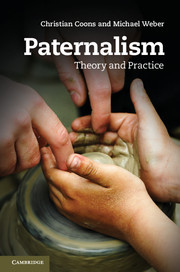Book contents
- Frontmatter
- Contents
- Contributors
- Introduction Paternalism – Issues and trends
- Chapter 1 Defining paternalism
- Chapter 2 Penal paternalism
- Chapter 3 Self-sovereignty and paternalism
- Chapter 4 The right to autonomy and the justification of hard paternalism
- Chapter 5 Moral environmentalism
- Chapter 6 Kantian paternalism and suicide intervention
- Chapter 7 Paternalism and the principle of fairness
- Chapter 8 Paternalism in economics
- Chapter 9 Choice Architecture: A mechanism for improving decisions while preserving liberty?
- Chapter 10 A psychological defense of paternalism
- Chapter 11 Libertarian paternalism, utilitarianism, and justice
- Chapter 12 Voluntary enslavement
- Chapter 13 Paternalism, (school) choice, and opportunity
- Bibliography
- Index
Chapter 6 - Kantian paternalism and suicide intervention
Published online by Cambridge University Press: 05 February 2013
- Frontmatter
- Contents
- Contributors
- Introduction Paternalism – Issues and trends
- Chapter 1 Defining paternalism
- Chapter 2 Penal paternalism
- Chapter 3 Self-sovereignty and paternalism
- Chapter 4 The right to autonomy and the justification of hard paternalism
- Chapter 5 Moral environmentalism
- Chapter 6 Kantian paternalism and suicide intervention
- Chapter 7 Paternalism and the principle of fairness
- Chapter 8 Paternalism in economics
- Chapter 9 Choice Architecture: A mechanism for improving decisions while preserving liberty?
- Chapter 10 A psychological defense of paternalism
- Chapter 11 Libertarian paternalism, utilitarianism, and justice
- Chapter 12 Voluntary enslavement
- Chapter 13 Paternalism, (school) choice, and opportunity
- Bibliography
- Index
Summary
Being theoretically opposed to paternalism is easy. That individuals, groups, and governments in particular, should refrain from interfering with individuals’ liberty, except in order to prevent exercises of liberty that harm others or infringe their rights, is an attractive philosophical proposition.
However, anti-paternalism is a bit tougher in practice. For example, many liberal-minded individuals who think of themselves as having anti-paternalist bona fides nevertheless appear to endorse various interferences with individual liberty. Mandating the wearing of seatbelts, restricting tobacco advertising, requiring minimal levels of health insurance: All of these might be justified (in part) on the grounds that they result in improvements in individual well-being. Wearing our seatbelts, refraining from smoking, and having minimal access to affordable health care are good for us. But how can support for these policies be consistent with opposition to paternalism?
The answer I favor is that the origins of our anti-paternalistic sentiments are as much Kantian as libertarian. For the Kantian, it is not liberty as such, the mere exercise of one’s will, that paternalism threatens. Liberty instead matters because, and to the extent that, exercises of liberty are exercises of rational autonomy. The autonomy in question cannot be reduced either to our ability to act on our choices or to our ability to choose what to do. Human action, on the Kantian picture, should not be seen simply as physiologically instigated bodily movement. We act for reasons, and our capacity to do so is a capacity for rational self-governance or self-direction. For the Kantian, paternalism is ethically suspect not because it constrains our behavior, but because it constrains our actions, and since to act is to act for a reason, paternalism can interfere with our rational autonomy. More precisely, paternalism is worrisome because it makes the object of paternalism a “means to ends of the paternalist’s making, rather than being recognized as the source of his or her own ends.”
Keywords
- Type
- Chapter
- Information
- PaternalismTheory and Practice, pp. 115 - 133Publisher: Cambridge University PressPrint publication year: 2013
- 11
- Cited by

